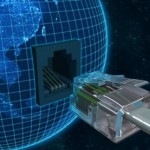 I would say that I’m something of an ‘online person’ I ran a Bulletin Board ‘the hard way’ in the late 1980s / early 1990s using a phoneline, a modem and a PC at home, and have been on the Internet in one way or another for over 20 years, and was involved with Prestel back in 1982/83. However, this article from the BBC made me do a serious reality check. Nearly four out of five people in a survey done of 27,000 folks around the world considered that Internet access should be regarded as a ‘fundamental right’.
I would say that I’m something of an ‘online person’ I ran a Bulletin Board ‘the hard way’ in the late 1980s / early 1990s using a phoneline, a modem and a PC at home, and have been on the Internet in one way or another for over 20 years, and was involved with Prestel back in 1982/83. However, this article from the BBC made me do a serious reality check. Nearly four out of five people in a survey done of 27,000 folks around the world considered that Internet access should be regarded as a ‘fundamental right’.
Now, this sort of thing crops up every now and again, and it always elicits the same response from me. At this point in the history of our planet, nonsense. Yes, information is increasingly important – even, or perhaps especially – in developing countries and economies. But a ‘fundamental right’? No. Let’s not forget that the Internet is a communications technology first and foremost – similar to the phone system, road and railway network, etc. And let’s face it, there are many people in the world without access to a reasonable road and railway system, let alone a phone system and the Internet.
Let me give you the run-down on precisely why I think that there are many rivers to cross before we get to the luxurious position of the Internet being a fundamental right.
The Internet can’t carry food…
Or people, or goods, or equipment. An information superhighway is great in an information economy, but of limited use when you have a subsistence, agricultural or manufacturing based economy. And let’s face it, whilst information is essential in developing new skills and supporting economies, it can be delivered in lots of old fashioned ways – like books, pamphlets, radio, TV.
The Internet needs power…
To deliver a reliable Internet service in to a country requires that that country have a viable and effective power supply. Even now, many developing countries do not have reliable power. Is it realistic to prioritise the right to the Internet over the right to a reliable and cheap energy source that can provide power for light, heating, entertainment, energy for industry?
What’s the point of an Internet without machines…
Even with projects like OLPC and other ideas to get computers in to developing nations, there will still be the problem of providing equipment and software in to developing nations in a sustainable and long term manner. A laptop computer – or a mobile phone, for that matter – is a complex piece of kit and is unlikely to be easily manufactured or maintainable locally.
The Internet doesn’t educate or heal
Whilst the information on the Internet may be helpful in education, just how much of it is relevant without literacy? And which is a more effective means of delivering basic and even advanced education in a developing nation? $1000 spent on a computer that might help 1 person, or the same amount spent on books and similar resources for a class? the Internet does not provide basic health care – it may provide useful information but cannot vaccinate.
The bottom line is that we live in a world of limited resources in which we have to prioritise those resources. To claim the Internet is a fundamental right is to forget that the real fundamental rights – a home, food, safe water and no local Gestapo kicking the door in because you disagree with your Government – are yet to be achieved over much of the planet. In a technologically advanced society their might be an excuse for this sort of comment, but in parts of the world where the next drink of water could kill you, it’s a luxury that cannot be realistically afforded.
